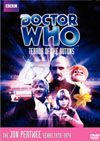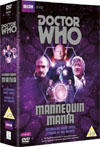DVD Extras include:
Season Eight - music by Dudley Simpson, realized by Dudley Simpson and Brian HodgsonDoctor Who's Eighth Season is special for a number of reasons, most of which cemented critical elements into place either for the program in general, or the Jon Pertwee Era in particular. The regular main cast of Doctor Who went up to six - a number which has not been matched since - allowing this year's stories to gain an unusually cosy level of viewer familiarity and be the most typical of the heart of Pertwee's era. The addition of an arch villain known as the Master, equal and opposite to the Doctor, was a brilliant move for the program, and the bulk of early Master stories are all in this one year.This is also the first season in which Dudley Simpson's monopoly over the program's music became absolute and total, an opportunity which he thankfully did not waste. He created some very memorable tracks specifically for the Master which are used throughout all the stories of the season, in addition to being very creative with electronic realisation of music. Some really nice musical effects are achieved with this electronic style, but it is sad in some respects that Simpson was limited to this style only all throughout the year, because at many points the more noticeable pieces become the ones that don't work so well after all - interrupting our attention and sticking out like a sore thumb, and after a full year of nothing but electronic music, the style loses the impression of freshness and gets taken for granted. I like Season Eight a lot, and move into it wholeheartedly looking forward to the changes it pioneered. However, it is not quite as polished or effective as the previous year, at least in terms of the individual stories. Each one offers something unique and different, and manages to excel in some areas while being flawed in others. This is one of the most difficult seasons to rank, and I expect every fan will rank it differently according to the stories' appeal to their personal tastes and preferences.
Terror of the AutonsRobert Holmes won the privilege of opening the season and introducing us to our new regular cast, a task that achieves a somewhat hit and miss success. To be fair, the problems with the Master's introduction aren't so much in the script as in the production, but there is no doubt that Roger Delgado is in superb form from the beginning. Pretty soon, Delgado's face and Simpson's theme music team up, and the Master we all know and love is born. This moment makes the Master's intro. Unfortunately the atmosphere is broken up all too quickly by a short, two-shot scene. We need that scene to complete the character exposition of the intro, and to help clarify the plot unfolding later in the story, but if only it had been done with more feeling..... Poor Delgado is not fortunate enough to be working with the cream of the crop yet.Jo Grant's intro is much, much smoother in the production, as Jon Pertwee and Katy Manning work well together right from the beginning. Their first scenes are funny and work extremely well. The Doctor even gets to make his entrance using his TARDIS, although here Holmes aims for the funny bone instead of a proper demonstration of the machine. Last but not least, we mustn't forget Richard Franklin's debut as Captain Mike Yates, a moment easily unrecognized thanks to the script's reference to him already being part of the team retroactively. I suspect Holmes was all set to bring Captain Munro back, until this was changed at the last minute. Curiously, Barry Letts' cameras seem to go out of their way to avoid Mike Yates all throughout his first episode, keeping him in middle- to long-shots or shooting only the back of his head, when he is allowed to be on camera at all and not just an off-screen voice. Thankfully, Yates cements himself in place as the Brigadier's right hand Captain before long, putting an end to the round robin of love-struck yokels we were stuck with on previous occasions. Sure, there is enough suggestion throughout the show that Mike and Jo might be getting a little sweet on each other, but this is held to a more decent and watchable standard and never gets overdone as it was with past captains & assistants. Finally the Brigadier and Benton show up on the scene, the Brigadier in top form as usual and doing the best justice possible to providing a suitable exit for the absent Liz Shaw. Benton just sort of shows up late in episode one to quietly do his usual thing, and he remains the most easily overlooked regular character throughout most of the season. Thanks to his exposure in "Inferno" (the previous story), he is at least present most of the time.
Robert Holmes' motivation for the Master in this introductory
story is too deep into fuzzy territory for my liking. Obviously,
much of what he does is simply a continuation of the sparring with
the Doctor that he reportedly enjoyed so much in the past. Okay fine,
no problems there. But what exactly does the Master want out of an
alliance with the Autons?
I'll say no more here; you can read the rest along with the
SPOILERS in the In-depth Analysis version
of this review.
But here's another question: What does the Master
want with Earth? To destroy it in
revenge and escape? No previous relationship between the Master and
the Earth is described to fuel that. Does he plan to stay on Earth
to rule it through the Autons? The Master's plans for the Earth
flip-flop about a little too easily all through his time on the
program to make good sense.
Episode Two is the least effective
in the story, looking cheap and filled with inane scenes of characters
who don't get acted out all that well at all.
The exception is
Harry Towb as Mr. McDermott, a fine actor putting a gem of a performance
into this touch-and-go production, who plays well off of his
fellow actors.
Michael Wisher's natural features are seen in this story better
than in any other, with his face clean-shaven and his haircut neat and
trim, and his acting is
superb as always in a role that becomes stranger and more demanding
as it progresses. I'm not sure I like the Rex Farrel character too
much later on, but this is mostly in the scripting.
Finally, let's look at what the Doctor actually gets to do in this
adventure. Jon Pertwee is not really at his best in this one.
Several of his scenes either don't really work or turn out less than
impressive, when he is accidentally stealing some of his fellow
actors' lines altogether. The rest of the Doctor's
shortcomings originate in the script. He seems all right in the first
half, a wily investigator as well as scientist and outcast Time Lord,
and a really likeable, friendly, reasonable kind of guy at that. Robert
Holmes' use of the Doctor's lab as a "home base" set throughout the
story is also quite excellent in pushing investigation to the forefront
of story dynamics. The Doctor even makes a very conscientious
gesture at one point - a nice touch. His character
is not so pure in the second half....
but I'll save all of that for the
In-depth Analysis version
of this review.
Dudley Simpson's music for the Master is limited in this
particular story to a very effective and recognizable electronic
sting, plus a "hypnosis" track, the two being played back-to-back
over the Master's entrance. The rest of the music is quite bold,
including some very distinctive melodic tracks played with harshly
simplistic electronic tones, at other times very short notes or
phrases bubble out with fresh creativity in electronic sound. The
two styles manage to complement each other fairly well in this
story, and though "Terror of the Autons" is one of the season's
better scores, only the two above-mentioned "Master" tracks survived
to be heard in later stories of the year.
Comments on this article are welcome. You may contact the author from this page:
|








